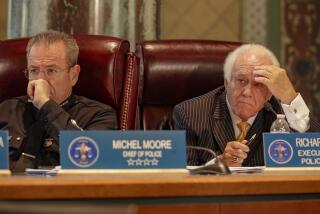The LAPD still needs policing
ALTHOUGH THE consent decree to reform the Los Angeles Police Department has been in place for almost five years, many of its requirements still have not been met. That’s why the federal court must extend it, in its entirety, for at least two more years.
The decree was approved by the city in 2000 -- in the wake of the Rampart Division scandal -- after an investigation by the U.S. Department of Justice found a “pervasive pattern” of constitutional-rights violations by the LAPD. The city signed on -- promising to reform many aspects of the LAPD -- in order to avoid a federal lawsuit.
The consent decree was crucial because, for decades, study after study had documented abuses by LAPD officers, but serious reform had never occurred. The pattern for the last 40 years has been consistent and disturbing. A highly publicized incident -- a beating, say, or a shooting -- involving misconduct by LAPD officers occurs, followed by an in-depth study proposing major changes. Some recommendations are adopted, but many are ignored. The city declares victory until the next incident, and the cycle begins again.
The Watts riots, the fatal shooting of Eulia Love in the 1970s, the Rodney King beating in 1991 and most recently Rampart -- all fit this pattern exactly.
The consent decree is vital because it requires reforms (rather than merely recommending them), creates an independent monitor to report on compliance and puts ultimate enforcement in the hands of a federal judge. Never before has the LAPD been mandated to make changes, nor has there been a mechanism to ensure that it does so. Much of the consent decree has been implemented; according to the LAPD itself, the department has complied with 149 of the 191 consent decree mandates.
Unfortunately, some of the most important requirements of the consent decree have not yet been met. Most notably, the computerized system for tracking officers’ disciplinary records -- the TEAMS II system -- still does not exist. This has been called the “heart and soul” of the consent decree by District Judge Gary A. Feess, who is assigned the case. The TEAMS II system will establish a computerized record of every officer’s use-of-force incidents, citizen complaints, traffic accidents and other data; it will not only help in evaluating and assigning officers but also in measuring the department’s overall success in meeting its goals.
Other key aspects of the consent decree, such as the nondiscrimination requirements, have yet to be fulfilled. Indeed, the data collected regarding motor vehicle and pedestrian stops show continuing bias. Initial data from 2002 documented that black and Latino motorists were still nearly three times more likely than white motorists to be asked to step out of their vehicles, four times more likely to be patted down and four times more likely to be asked to submit to a search. Subsequent data in 2005 showed that this pattern continues.
On Friday, the city of Los Angeles and the Justice Department asked the court to extend portions of the consent decree for two years. Although this is a step in the right direction, they are wrong in asking for only some of it to remain in effect. For example, it is inexplicable that they want to discontinue the provision that requires senior officers not to discourage the filing of complaints, a serious problem documented by many. There is no cost to the city from continuing a provision like this.
Most troubling, they would phase out the independent monitor over the next year and have the Police Commission’s inspector general take over responsibility for assessing compliance -- even though the inspector general’s office is demonstrably not yet ready for that task. An independent assessment of the LAPD’s performance is crucial, and the monitor -- Michael Cherkasky, who was appointed by the federal court -- has revealed serious deficiencies within the inspector general’s office.
Until the inspector general has fully complied with consent decree requirements and shown an ability to perform full and fair independent reviews, the city needs external oversight from the independent monitor.
There is no reason to let the consent decree lapse, and there are compelling reasons to continue it. Everyone benefits by the assurance that the long-overdue changes in the LAPD will occur.
More to Read
Sign up for Essential California
The most important California stories and recommendations in your inbox every morning.
You may occasionally receive promotional content from the Los Angeles Times.










